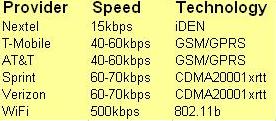The cellular wireless data industry is notorious for hyping the theoretical data rates, rather than the typical data speeds, you won’t get the theoretically maximum speeds. Here are the typical data speeds of wireless data:

Nextel currently has a wireless data service which gives users an average speed of 15 kilobits per second (kbps).
Nextel recently announced plans to upgrade its data network to support speeds over 70 kbps by the end of 2004. The upgrade will use Motorola's WiDEN technology, an upgrade for iDEN networks that quadruples data rates.
AT&T Wireless and T-Mobile use GSM technology and currently use GSM/GPRS (General Packet Radio Service) for wireless Internet services, which transmits data at speeds from 40 kbps to 60 kbps.
AT&T Wireless announced the nationwide deployment of EDGE as an upgrade to its GSM/GPRS system, Enhanced Data rates for Global Evolution, or EDGE. A user can transmit data at speeds between 100 and 130 kbps.
Sprint PCS and Verizon Wireless have deployed a technology from Qualcomm called CDMA20001xrtt, which usually operates at about 60kbps to 70kbps.
Verizon Wireless has targeted Washington and San Diego as the first two cities to roll out high-speed wireless service called 1xEV-DO with data speeds of 300kbps - 500kbps. 1xEV-DO devices are required to receive this service.
WiFi (aka Hot Spots) 802.11b typically provides real speeds of at least 500 kbps, and often much faster.
JohnB
Nextel currently has a wireless data service which gives users an average speed of 15 kilobits per second (kbps).
Nextel recently announced plans to upgrade its data network to support speeds over 70 kbps by the end of 2004. The upgrade will use Motorola's WiDEN technology, an upgrade for iDEN networks that quadruples data rates.
AT&T Wireless and T-Mobile use GSM technology and currently use GSM/GPRS (General Packet Radio Service) for wireless Internet services, which transmits data at speeds from 40 kbps to 60 kbps.
AT&T Wireless announced the nationwide deployment of EDGE as an upgrade to its GSM/GPRS system, Enhanced Data rates for Global Evolution, or EDGE. A user can transmit data at speeds between 100 and 130 kbps.
Sprint PCS and Verizon Wireless have deployed a technology from Qualcomm called CDMA20001xrtt, which usually operates at about 60kbps to 70kbps.
Verizon Wireless has targeted Washington and San Diego as the first two cities to roll out high-speed wireless service called 1xEV-DO with data speeds of 300kbps - 500kbps. 1xEV-DO devices are required to receive this service.
WiFi (aka Hot Spots) 802.11b typically provides real speeds of at least 500 kbps, and often much faster.
JohnB

Comment